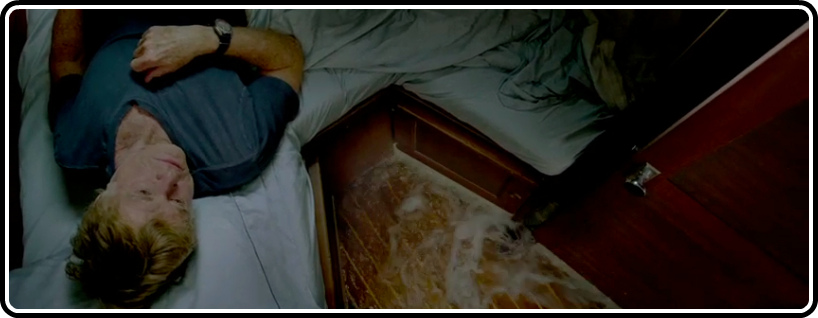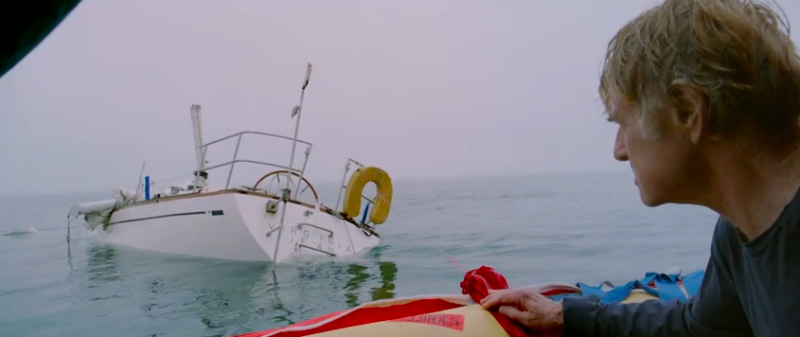
J.C. Chandor made quite a splash with his feature-length debut, Margin Call, a talky examination of the kind of greed that motivated the 2008 financial collapse. In spite of a pretty fine screenplay, however, it never really came alive as a motion picture. Too eager to push contrast and bright lights, Chandor seemed eager to distract from his relative lack of interest in the finer points of the medium like composition, movement, and cutting. That he would then be inclined to make a film with almost no dialogue, one that would depend entirely on his visual chops to tell the story and convey the emotions, is certainly a departure worth noting. I admire the hell out of his ambition, and even if the resulting effort comes up a little short, it displays a huge step forward for Chandor as a true storyteller. His images are often sublime, his cutting sharp (perhaps too sharp) and clear, but the emotional arc he’s conveying is at once too elemental and too concise.
Robert Redford plays the only role in the film, a nameless man on a yachting trip, during the course of which he gradually becomes more and more stranded at sea. It’s a nightmare scenario for even the most experienced sailor, and though our protagonist knows his way around a vessel, it’s clear pretty quickly that he’s far from a master. His boat takes several hits before he’s really in dire straits, and it seems like he can handle most of the troubles one would encounter on even an eventful voyage. But they do give you that life raft for a reason…

Chandor’s rigor in depicting his protagonist’s descent is admirable, but at times a little suffocating. In his need to have every shot communicate some change – new damage, new survival techniques, Redford surveying or repairing or learning or discovering – he also loses the stillness, and by extension, the loneliness and hopelessness of isolation. Consider a similar sequence in John Patrick Shanley’s masterful Joe Versus the Volcano, which shows Joe discover barely-adequate means of survival, find a sort of inner peace amidst the hopelessness, struggle with starvation and thirst, and eventually reach a spiritual epiphany on the eve of his rescue. It’s beautiful, melancholic, tragic, and ultimately redemptive, and the fact that Shanley pretty much lets Joe kind of just rest in the situation he’s in is tremendously brave. Granted, the fantastical tone allows him to avoid many of the more urgent needs such a character would have, but Chandor would have benefited greatly from some sort of balance. After all, when you’re stranded at sea, most of your day will involve just sitting there, and any representation to the contrary is somewhat dishonest.
Within these confines, however, Redford is quite remarkable. Free of any of the burdensome bullshit that typifies a survival story (Sandra Bullock’s backstory in the recent Gravity being the most immediate example), Redford has only his element to contend with, suggesting strands of a character within behavior, reactions, and decisions. He’s given an opening monologue that I feel is a bit of a cheat in crafting the character, but which certainly suggests much about his very motivation for the trip (a bit of self-imposed isolation, perhaps). His age itself – Redford is 77, and not trying to hide it – is a source of constant tension, his muscles only able to hold so much, his balance perhaps not what it was when he learned much of his sailing skill, and his lungs not quite capable of the capacity they once had. Chandor portrays the physical demands here beautifully, not at all ignoring the fact that this guy is in it a lot worse than someone half his age would be.
Beyond that, though, this is a pretty straight survival story, free from a specific emotional or spiritual expression. It is almost as though Chandor wanted to replicate the purposeful flatness of A Man Escaped, without the willingness Bresson had to reduce Redford all the way to a cypher. He merely remains adrift, ready to move from plot point to plot point without a moment’s hesitation. Those moments may mostly work, and occasionally be quite thrilling (the result of his fishing endeavor is particularly striking, and his efforts to find water are rather ingenious), but the cumulative effect is the sort of impatience that is wildly out of sync with the story being told.



